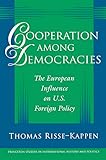Cooperation among Democracies : The European Influence on U.S. Foreign Policy / Thomas Risse-Kappen.
Material type: TextSeries: Princeton Studies in International History and Politics ; 183Publisher: Princeton, NJ : Princeton University Press, [2021]Copyright date: ©1995Description: 1 online resource (260 p.) : 2 tablesContent type:
TextSeries: Princeton Studies in International History and Politics ; 183Publisher: Princeton, NJ : Princeton University Press, [2021]Copyright date: ©1995Description: 1 online resource (260 p.) : 2 tablesContent type: - 9780691222196
- European cooperation
- Security, International
- POLITICAL SCIENCE / International Relations / General
- Acheson, Dean
- Adenauer, Konrad
- Attlee, Clement Richard
- Berlin
- Brandt, Willy
- Bundy, McGeorge
- Carter, Jimmy
- Churchill, Winston
- Cuban Missile crisis
- De Gaulle, Charles
- Eden, Anthony
- France
- German Democratic Republic (GDR)
- Great Britain
- Humphrey, Hubert (Senator)
- India
- International Monetary Fund (IMF)
- Israel
- Japan
- Kant, Immanuel
- Kennedy, John F
- Korean War: and allied community
- Lloyd, Selwyn
- Macmillan, Harold
- Menon, Krishna
- Morgenthau, Hans
- Pauling, Linus
- Rusk, Dean
- Schmidt, Helmut
- Soviet Union
- Stevenson, Adlai
- Thucydides
- Turkey
- United Nations (UN)
- Warsaw Pact
- arms control
- authoritarian regimes
- domestic politics
- détente
- end of the cold war
- flexible response
- leadership beliefs
- liberal theory
- neutron bomb
- norms
- nuclear war
- nuclear weapons
- preferences
- realism
- regime analysis
- security community
- social constructivism
- test ban
- transgovernmental coalitions
- 327.73/009/045 20
- JX1417 .R57 1995
- online - DeGruyter
| Item type | Current library | Call number | URL | Status | Notes | Barcode | |
|---|---|---|---|---|---|---|---|
 eBook
eBook
|
Biblioteca "Angelicum" Pont. Univ. S.Tommaso d'Aquino Nuvola online | online - DeGruyter (Browse shelf(Opens below)) | Online access | Not for loan (Accesso limitato) | Accesso per gli utenti autorizzati / Access for authorized users | (dgr)9780691222196 |
Browsing Biblioteca "Angelicum" Pont. Univ. S.Tommaso d'Aquino shelves, Shelving location: Nuvola online Close shelf browser (Hides shelf browser)

|

|

|

|

|

|

|
||
| online - DeGruyter Victorian Sappho / | online - DeGruyter The Ghost Festival in Medieval China / | online - DeGruyter The Military Revolution and Political Change : Origins of Democracy and Autocracy in Early Modern Europe / | online - DeGruyter Cooperation among Democracies : The European Influence on U.S. Foreign Policy / | online - DeGruyter The Haymarket Tragedy / | online - DeGruyter Aristotle on Substance : The Paradox of Unity / | online - DeGruyter Currency and Coercion : The Political Economy of International Monetary Power / |
Frontmatter -- CONTENTS -- PREFACE -- ABBREVIATIONS -- ONE. INTRODUCTION AND OVERVIEW -- TWO. Cooperation among Allies: Power Bargaining or Democratic Community? -- THREE. "Outposts of Our National Defense": Consultation Norms and the Moderation of U.S. Policies during the Korean War, 1950-1953 -- FOUR. "Unworthy and Unreliable" Allies: Violation of Alliance Norms during the 1956 Suez Crisis -- FIVE. "A Game of Golf and a Little Talk": Transnational Coalitions and the 1958-1963 Test Ban Negotiations -- SIX. A "Strike on Cuba which May Lose Berlin": The Europeans and the 1962 Cuban Missile Crisis -- SEVEN. Blowing Up New York to Save Berlin? Norms, Transnational Relations, and NATO's Nuclear Decisions -- EIGHT. Conclusions: The Transatlantic Community and the European Impact on American Foreign Policy -- BIBLIOGRAPHY -- INDEX
restricted access online access with authorization star
http://purl.org/coar/access_right/c_16ec
In exploring the special nature of alliances among democracies, Thomas Risse-Kappen argues that the West European and Canadian allies exerted greater influence on American foreign policy during the Cold War than most analysts assume. In so doing, he challenges traditional alliance theories that emphasize strategic interactions and power-based bargaining processes. For a better understanding of the transatlantic relationship, the author proposes that we instead turn to liberal theories of international affairs. Accordingly, liberal democracies are likely to form the "pacific federations" described by Immanuel Kant or "pluralistic security communities" as Karl W. Deutsch suggested. Through detailed case studies, Risse-Kappen shows that the Europeans affected security decisions concerning vital U.S. interest during the 1950-1953 Korean war, the 1958-1963 test ban negotiations, and the 1962 Cuban missile crisis--all during a span of time in which the U.S. enjoyed undisputed economic and military supremacy in the alliance. He situates these case studies within a theoretical framework demonstrating that the European influence on decision-making processes in Washington worked through three mechanisms: norms prescribing timely consultations among the allies, use of domestic pressures for leverage in transatlantic interactions, and transnational and transgovernmental coalitions among societal and bureaucratic actors. The book's findings have important repercussions for the post-Cold War era in that they suggest the transatlantic security community is likely to survive the end of the Soviet threat.
Mode of access: Internet via World Wide Web.
In English.
Description based on online resource; title from PDF title page (publisher's Web site, viewed 30. Aug 2021)


